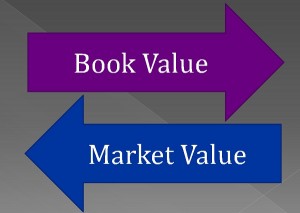Difference between book value and market value?
Book Value:
book value of an asset is simply its original purchase cost, adjusted for any subsequent changes, such as for impairment or depreciation.
Market value
Market value is the price that could be obtained by selling an asset on a competitive, open market.
There is nearly always a difference between book value and market value, since the first is a recorded old cost, and the second is based on the real supply and demand for an asset, which can vary constantly.

The book value of an asset is simply its original purchase cost, adjusted for any subsequent changes, such as for impairment or depreciation.
You May Also Read to Like:
Basic Accounting Terms
Classification of Assets and Liabilities
For example, a company buys a Motor Vehicle for Rs. 500,000 and subsequently records depreciation of Rs. 50,000 for that Motor Vehicle, resulting in net book value of Rs. 450,000. If the company were to then sell the Motor Vehicle at its current market price of Rs. 470,000, the business would record a gain on the sale of Rs.20,000.
As shown by the example, the difference between book value and market value is recognized at the point of sale of an asset, since the price at which it is sold is the market price, and its net book value is essentially the cost of goods sold. Prior to a sale transaction, there is no reason to account for any differences in value between book value and market value.
One situation in which a business can identify changes in the value of assets is for marketable securities classified as trading securities. A business is required to continually record holding gains and losses on these securities for as long as they are held. In this case, market value is the same as book value.
When the difference between book value and market value is considerable, it can be difficult to place a value on a business, since an evaluation process must be used to adjust the book value of its assets to their market values.
There are situations when the market value of a fixed asset is much higher than book value, such as when the market value of an apartment increases due to increased demand. In these situations, there is no way under Generally Accepted Accounting Principles (GAAP) to recognize the gain in a company’s accounting records.
